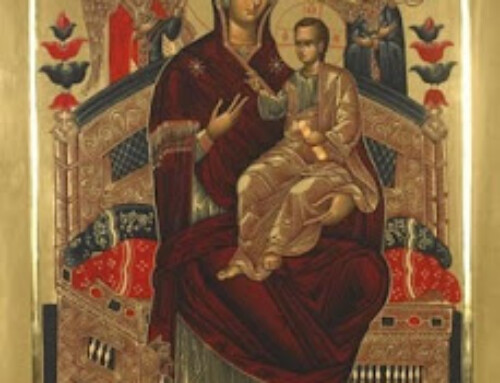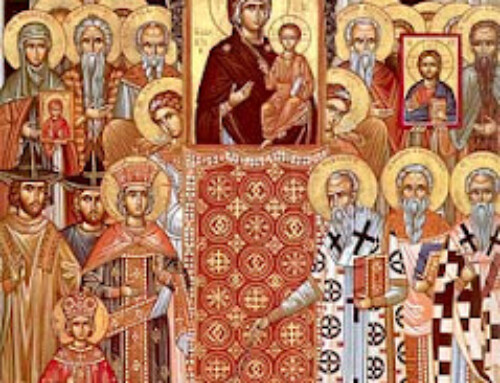Word Magazine March 1983 Page 26-27
YOUR CHILD IN THE CHURCH
By Very Rev. Paul Ziatyk
Your child is made a member of the Church of Jesus Christ when he is baptized. He is united to the Body of believers through the rituals of initiation and it is an occasion for all of the Church’s members to rejoice and honor the newly born. He is claimed as a member of the Church. He is grafted to the true vine with its life-giving branches. He is truly a member of the Body of Christ of whom Christ is the head and His people are the various members of the body with various functions.
Being born of water and the spirit, it is imperative that the newly baptized and chrismated child be nourished with the graces of the Church which are so necessary for the child’s religious-spiritual growth. How unfortunate it is for the child who is given life, but whose physical and emotional needs are not met. Such a child suffers malnutrition; his physical development is impaired and his psychological growth is stunted. If such a condition continues for any length of time, the deterioration which takes place in the child is often irreversible and the child may die. The importance of good parenting in the early years cannot be over-emphasized, for the child’s future development is dependent upon good nutrition and a loving parent. So it is with the child who is made a member of the Church. Important as it is to have a child baptized and chrismated, it is not sufficient for the religious development of the child during infancy. For baptism and chrismation are compared to being born. Once the child is introduced to the “new life in Christ,” “the life of the Church,” it becomes necessary to sustain this life. This a good Orthodox parent does by regularly bringing the child to church in order to receive Holy Communion and the blessings of the Church which are all life-creating. The Orthodox Church strongly emphasizes the religious importance of infancy.
Children are entrusted to parents by God and it is the parents’ responsibility to raise God-fearing, God-loving children, helping them become mature Christians. The Church plays a major role in the child’s religious growth pattern. The parents who bring their children to the House of God, the place where God’s people gather as His family, will greatly benefit in knowing that they are being responsible stewards before God. Not only do parents bring their children to God so as to give thanks for that with which they are entrusted, but they come to dedicate and consecrate their children to God and His Holy Church.
Parents soon discover that by bringing their young child to church he is being introduced to the life of the Church and that he is discovering the world of Christian faith through his senses. Gradually he learns that the church is a special place, set apart from home and the few other places with which he is familiar. In the church his sense of smell is heightened by the sweet aroma of the incense. His eyes are fascinated by the golds and other rich colors of the icons, the church interior and the flickering candles. His ears hear the angelic voices of the choir and he is more than often lulled to sleep. His lips taste the Holy Communion and he experiences a taste quite different from the foods so familiar to him. He quickly learns to mimic adult behavior and gets special pleasure in going to God’s House. He looks forward to doing certain things. By the age of two he attempts to make the sign of the cross with awkward movements of his hands and fingers, seeking parental approval for a job well done. He enjoys kissing the icons, lighting candles, kneeling, standing, prostrating. He gradually learns the time for Communion and, with his arms crossed over his chest, anxiously waits for the priest to come forth with the chalice. And last, but not least, there is the ritual for dismissal: kissing the cross, taking a good look with big eyes at the priest who is dressed so differently, waiting for some word or touch of the priest’s hand expressing his love toward him, and then the opportunity to take a handful of the antidoron (holy bread).
From the above we see that infants and young children are indeed members of God’s family who participate in worshipping Him. The child is not separated from the family, nor is he excluded from worship. He is not kept home while the parents go to church, nor is he confined to a nursery under the supervision of a babysitter. He is a part of the doing and the receiving. He participates with those gathered to do something, and that something is to become the Body of Christ through the common participation in the One Cup and One Flesh. He participates in his childlike manner, without having to wait until he intellectually understands what is taking place.
With regard to little children in the church, our Orthodox Church takes our Lord’s words seriously. He said:
Let the children come to me, do not hinder them; for to such belongs the kingdom of God. Truly I say to you, whoever does not receive the kingdom of God as a child shall not enter it. And He took them in His arms and blessed them, laying His hands upon them. — Mark 10:14-16
Surely there is a place for the little ones in our Church. They belong in a very real sense to the Word. They are welcomed and the Church, our Mother, blesses them.
Indeed, how beautiful it is to see the little ones in church and the manner in which the faithful respond to their presence. Most everybody loves to see a newborn infant, a toddler taking his first steps, a young one getting too big to hold. How good it is to see not only parents and God-sponsors holding the children, cuddling them and fussing over them, but to see faithful doing the same thing after the services, trying to guess who the baby resembles. Our Lord’s injunction “let the children come to me” is being fulfilled. The children are brought to Christ in His Church; it is His arms into which they are being taken; it is He who blesses them and lays His hands upon them, for He has no other arms and hands but ours.
These personal relationships within the group which are established with the child play an important role, for children are more easily caught than taught. These personal relationships which have their beginning in infancy will form the foundation for later religious interaction and growth. Growing children are very impressionable. They know who loves them and who does not. Love has the power to form lasting relationships. The adult example speaks more strongly than words. It is a silent sermon. The little ones are influenced by what they see. If brothers and sisters dwell in a spirit of unity, the child will feel secure within the group and unconsciously have a positive experience.
Church history bears out the fact that saintly parents greatly influence their children. Saint Sophia instilled in her three very young daughters such an unwavering steadfast faith that cruel tortures and even the threat of death did not alter their firm Christian convictions. Saint Basil’s parents were respected, God-fearing people. Three of their children are numbered among the saints of the Church: Saints Basil, Gregory of Nyssa and Macrina. Saint Gregory the Theologian’s parents were likewise God-fearing people who, having been childless for many years, upon the birth of a son dedicated him to God in a display of gratitude.
Earlier it was said that children are more easily caught than taught. Orthodox parents ought not make the mistake of bringing their children to receive Communion and then abstain themselves. The Holy Gifts are spiritual food for all those in the Church who are prepared to receive, including parents. It is important that the whole family partake together. Else when the children grow up, they too will be falsely led to believe that Communion is only for infants and young children. The Holy Gifts are offered for the sanctification of the whole family and the fellowship of all believers gathered in one place on the Lord’s Day. Because of existing circumstances, which do not justify the practice of infrequent Communion, parents may feel that they cannot partake of the Life-Creating Gifts every Sunday, but they certainly can strive to discipline their lives so as to partake more frequently, perhaps once a month.
Parents who bring their children into the church on a regular basis make an effort to insure themselves against later hurt. They lay a firm foundation for their children’s future religious growth. Nothing can replace the joy and peace that comes from a shared experience of being part of the Church, of belonging to the Body, of establishing personal relationships within the community of believers.
Children are fascinated by candlelight and love to participate in the ritual of lighting candles. Explain to them why we light candles. The candle reminds us of Jesus Christ Who is the Light of the World, Who came to show us the Way to be good. Explain that the lighted candles create a feeling of warmth and joy. They make us feel good and create a feeling of wanting to be with God. Give your children candles and assist them in lighting them by steadying their hands. Then help them place them in the holders, making sure they are secure and upright.
Children love to show their affection to others by kissing. Just as they kiss their mother, father and grandparents, expressing their love, so God’s people kiss the icons of Jesus, His Mother and the saints, showing their love. The piety of the faithful will influence children. Venerate icons properly and your children will do likewise, although they will no doubt need assistance. It is sad to see a young child standing before an icon, waiting to bless himself and to kiss it, with no one to help him. He needs someone to help him cross himself properly and then to lift him up in order to kiss the icon. When this is done, one sees the satisfaction which comes with having done what is pleasing to God.
Making the sign of the Cross is one of the first religious acts that a child learns to mimic from his parents. The two-or three-year-old child still lacks the motor skills and coordination necessary to bless himself properly; through constant practice he will have perfected this skill by the time he is four or five. He must be taught how to hold his fingers, what words to pray and the pattern in which to move his hand. It is important that parents make the sign of the cross on their children as they put them to bed.
The Orthodox Church is so rich in what meets the eye. This visual richness should be used to teach the faith to young children. A parent can take one visual aid per week and explain it to the child. Simple explanations with few details are best:
That is an icon of Jesus who loves us. He is God. We love Him and pray to Him. He blesses us, teaches us and gives us food.
That is the Gospel. It is a beautiful book that tells us how much God loves us.
That is the Chalice. It is the cup from which God feeds us.
In explaining the Liturgy to your very young child it is best to point out only the most obvious to him: the priest, God’s people, the Gospel, the Cross, the chalice, the altar boys, the candles, the censer, the time to listen and to be very attentive and quiet, the time for communion. As the child gets a little older, the small book We Praise God, published by the Department of Religious Education of the Orthodox Church in America, can be obtained by parents. Using the large pictures the parent can teach the child to recognize the main points of the Divine Liturgy.
As stated throughout this article, little children want to be part of the action. A two-or three-year-old wants to imitate his parents. Let him put the offering envelope in the collection plate as it is being passed. Explain that this money is for God and His Church.
The very young child held in the arms of his parents is often lulled to sleep during the service by the singing of the choir. The most he may do in terms of singing in these early years is to mimic sounds. Periodically it happens that when the choir stops singing, the child surprises the faithful with his sounds; as he gets a little older, he may progress to singing a word or two, often in the dead silence. This ought not be discouraged. Such incidences are unforgettable in beauty. The psalmist wrote: “Out of the mouths of babes and sucklings hast Thou ordained praise.” As the child’s vocabulary develops he can be taught to sing simple phrases such as “Amen,” “Lord have mercy,” and “Grant it, O Lord.” If the parents join in singing along with the choir, the child will spontaneously do so.
The church is a special place not only for adults but also for little children. It is a place where God’s people gather to worship. Therefore, parents must prepare their little child for this experience just as they prepare themselves. Special clothes ought to be set out for the occasion. Parents must transmit a spirit of joy and anticipation to the child. This can be done by parents who love going into the House of the Lord and who express this by their eagerness to stand in the Presence of the Lord and among God’s people. The parents’ attitude toward church attendance is also important. Attendance should be regular and not haphazard.
By making the experience of going to church “something special” for the child, parents cooperate with God in nurturing the child who is called to grow in faith and in the knowledge of God.
Chapter 5 in a series called “The Cradle Roll.”




